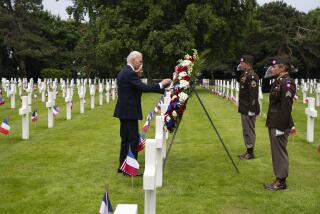Europe, After 9/11, Stands in a U.S. Shadow
The primary American transatlantic relationship has been moved eastward, away from London, Paris and Berlin to Moscow. Nuclear war between East and West has been consigned to the history books. And, as if on cue, the nuclear powers on the Indian subcontinent have rattled their rockets, ready to unleash an Armageddon that will fall on Asia, not on Europe as we had been brought up to fear.
Meanwhile, it has become clear that the Bush administration considers its job all but done in Afghanistan. The bombing has given the American people their pound of flesh. Reconstruction and the other idealistic goals of nation-building can be left to Europe.
If the U.S. sees a role for itself in this part of the world any longer, it is only as an emergency interlocutor to try to talk the Indians and Pakistanis out of nuclear madness. But if it ends in nuclear war, the U.S. “has no dog in that one,” and the Europeans can be left with helping bury the millions of dead and clearing up the political mess.
A decade ago, the Cold War seemed really over. I thought my children would enter adulthood without the fears that haunted my own childhood. Democracy was spreading fast. “Human rights” was the new buzzword. War of a major kind seemed not only unlikely but irrelevant in a world where the forces of globalization had become so dominant that no one had to spell out that if we didn’t all hang together we’d hang separately.
Ten years ago, the center of gravity was moving back toward Western Europe. European civilization had dominated the world for better or worse for 400 years and was about to do so again. The U.S., during and after World War II, had briefly taken command but now was slipping back to its isolationist role. Europe appeared to be regaining its old step in setting the political and cultural pace for the world. There was a sense of creating a civilization that was to flourish without conquest, cooperate without violent diction or action and seek only to propagate the rule of law for solving both society’s and the world’s disputes.
It wasn’t Slobodan Milosevic who blew a hole in all that; Yugoslavia was merely a throwback to an era the rest of Europe had long matured out of. Likewise it wasn’t the sudden bursting of ethnic disputes and wars all over the place. In fact, by 1993 the number of ethnic disputes began to fall dramatically, as did the number of wars.
It was simply that Osama bin Laden made George W. Bush’s day. Without Sept. 11, this most unintelligent, uncharismatic and nonvisionary of recent American presidents would have faded into obscurity, along with much of his hard-bitten, imperialistic program. Russia never would have countenanced giving up the fight on the renunciation of the Antiballistic Missile Treaty, and it never would have stepped forward to embrace the U.S. with the personal warmth that Vladimir V. Putin has exhibited, overriding the views of many of his closest advisors.
The Russian elite might well have moved willingly to forge a close relationship with Western Europe, but now European eastern policy, in comparison with U.S. single-mindedness, seems in disarray. Worried about how to honor its promise to bring Eastern European members into the fold, the European Union has stopped thinking of how to deal with Russia.
Today, the U.S. clearly calls the shots. It makes the big decisions on who needs a good kick and when. If China is not yet intimidated by this, it soon will be. Meanwhile, Europe is in danger of muddling along. Its common currency, functioning and effective, is doing wonders for the marketplace, but the political and cultural muscle that should grow out of it remains flabby. If Europe does become merely a “used-up” civilization, it is a turn of events that the world will live to profoundly regret.
More to Read
Sign up for Essential California
The most important California stories and recommendations in your inbox every morning.
You may occasionally receive promotional content from the Los Angeles Times.










